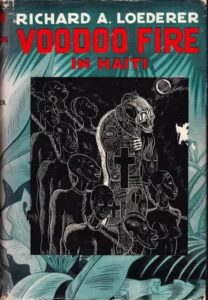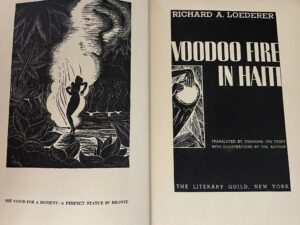A Review of Voodoo Fire in Haiti: Another Heart of Darkness
Loederer, Richard A. Voodoo Fire in Haiti, Country Life Press, 1935.
Richard A. Loederer was an Austrian-born, talented painter, etcher, designer, illustrator, cartoonist, commercial artist, and writer, a busy man who as this book reveals, also had the heart of a determined explorer. My first edition was a hardback in excellent shape. Haiti was then, as now, inhospitable to white visitors. He reveals that his desire to write this book was to “visit and explore this strange county [Haiti] and discover how much if any was true of the rumors of secret cults, black magic, and human sacrifices which were reported to exist in present-day Haiti. Written during the American Occupation of Haiti, 1915-34, this memoir traces his journey from New York to Haiti, recording his detailed observations on the people, the history of Haiti, the foods, plants, wildlife, customs, the markets, monuments, corrosion of business, the few foreigners that were left, the corrupt and incompetent government, and geography.
His wanderings through the island take him historically from the landings of Columbus to the Massacre River, to a cross-country journey by boat and on foot through the jungle, along a jungle as dense as anyone could find anywhere in the world. His account of wrestling with the weather, the insects, the thick growth and his efforts to reach the next settlement through a wild and desolate region are an indication of how determined this artist was. He made works of art (all included in my book) of what he saw in Haiti. Read his jungle journeys and his thoughts on the white men who came to Haiti who stayed and became a part of the jungle. It reminded me of Conrad’s Heart of Darkness in many ways.
Interesting also are his accounts of the Palace Demesne, the President’s palace, and Christophe’s La Ferrière. There are short biographies of the people who made Haiti: from the French Army, the plantation and business tyrants, to the black tyrants who took over Haiti.
As the title suggests, much of this memoir deals with and describes the origin, ceremonies, and pervasiveness of voodoo in Haiti. I think the work demands a detailed study guide and glossary to fully grasp the power of this memoir.
Rickey Pittman


